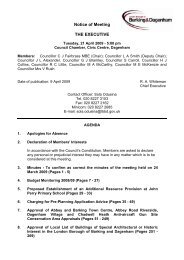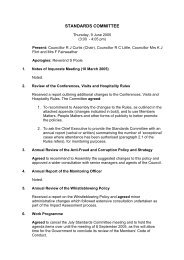Speach and Language Therapy (SALT) - Meetings, agendas, and ...
Speach and Language Therapy (SALT) - Meetings, agendas, and ...
Speach and Language Therapy (SALT) - Meetings, agendas, and ...
Create successful ePaper yourself
Turn your PDF publications into a flip-book with our unique Google optimized e-Paper software.
However, this is only a second best option. The first option will always be to<br />
have speech therapists delivering speech <strong>and</strong> language programmes.<br />
With the current remodelling of the work force, which involves the regrading of<br />
SSAs the unions may not agree to their members delivering these<br />
programmes on their current levels of pay. Speech <strong>and</strong> language needs time<br />
<strong>and</strong> funding, which should be reflected in the level of SEB funding received by<br />
schools. Speech <strong>and</strong> language therapy is a health issue as well as an<br />
educational issue <strong>and</strong> therefore should also be funded by the NHS. There<br />
should be also programmes that address the specific needs of those children<br />
who experience difficulty around their speech <strong>and</strong> articulation. As a school<br />
they have received intensive training on speech <strong>and</strong> language from the<br />
Speech <strong>and</strong> <strong>Language</strong> Needs Team. The school is committed to ensuring<br />
that all children are able to access the curriculum. No one should be<br />
expected to do work of another professional body with no formal training. If<br />
children are truly valued they need to have access to the very best speech<br />
<strong>and</strong> language service. Unfortunately this is not happening unless parents can<br />
afford to pay for such a service.<br />
A letter was received from the Chair of Governors of St Joseph’s RC School<br />
Barking. In her letter she commented that pupils' statements were not met<br />
with regard to the provision of Speech & <strong>Language</strong> <strong>Therapy</strong> by a qualified<br />
therapist. The move towards therapists visiting schools to work with both the<br />
children <strong>and</strong> school staff in a known environment rather than taking children to<br />
clinics where they are not comfortable was advantageous to all. The recent<br />
initiative by the JPD for speech <strong>and</strong> language was to be applauded. Any<br />
initiative jointly funded by Education & Health gives recognition to the<br />
importance of speech <strong>and</strong> language within an education environment.<br />
However as a consequence of this initiative the importance of trained Speech<br />
& <strong>Language</strong> Therapists must not be lost. The writing of programmes <strong>and</strong> their<br />
delivery can only be managed by a trained therapist working closely with the<br />
pupils, staff <strong>and</strong> parents/carers. Their role in the delivery of all speech <strong>and</strong><br />
language therapy is essential to its future success.<br />
In her letter the Deputy Head <strong>and</strong> SENCO at Grafton Infants School made the<br />
following comments. There was no speech therapy available to most children<br />
although initial assessments did take place. There was a 20 week waiting list<br />
for assessment. Children entitled to therapy through a Statement were not<br />
receiving this. Some parents were paying for private therapy although for<br />
many this was not affordable. Children working with Communication Needs<br />
Team based at Trinity do get therapy. However, they are limited as to the<br />
number of children they can take on. Parents of nursery age children are<br />
being told that a therapist will work with their children in school. This does not<br />
happen.<br />
2.3.3 Voluntary sector views<br />
A letter was received from the Chair of the Barking & Dagenham Deaf<br />
Children's Society (NDCS). There is a local organisation of parents, families<br />
<strong>and</strong> carers that exist to support parents in enabling their child to maximise<br />
their skills <strong>and</strong> abilities. The fundamental role is to advocate for parents <strong>and</strong><br />
26

















